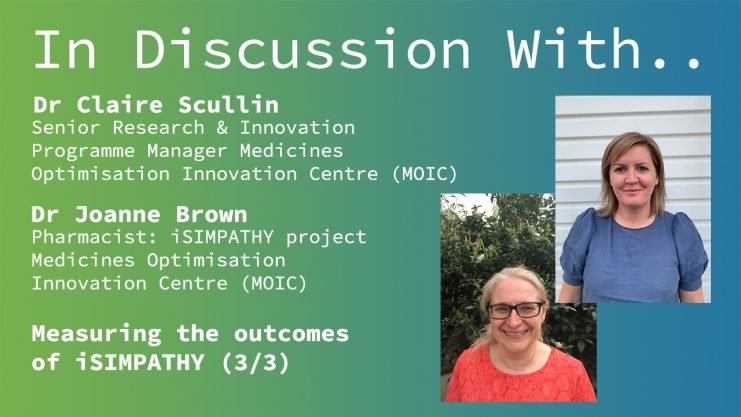Advertisment
Measuring the outcomes of iSIMPATHY

Interview and article by Christine Clark.
Dr Claire Scullin explains how the iSIMPATHY project has been designed to end up with sustainable scheme to manage polypharmacy that has been rigorously evaluated.
By 2022 it is hope that the iSIMPATHY project, which started in February 2021, will have delivered 15,000 polypharmacy medicines reviews. In addition, 120 health care professionals will have been to carry out polypharmacy medicine reviews in a systematic way. These could include hospital doctors, GPs, other pharmacists and nurses. It is important that the approach developed for the study is sustainable going forward, explains Dr Scullin. “We want to contribute towards the embedding of a single approach for polypharmacy management as well as firmly establishing the cross-border element of this field”, she adds.
It will also be critical to undertake a rigorous evaluation to demonstrate evidence of benefit to patients and to make recommendations for further work. The Eden intervention scale and the Medication Appropriateness Index (MAI) will be used to assess the impact of interventions. Patient-reported outcome measures (PROMs) will also be used to capture the patient experience.
The Eden intervention scale provides a way of grading pharmacists’ interventions. “Some interventions can be significant but don’t make that big a difference in patient care but the majority of interventions we have shown are grade 4 or above which indicates that there is also an improvement to patient care”, says Dr Scullin.
The Medication Appropriateness Index (MAI) is a well-known validated tool. As part of this project it has been adapted to include a person-centred element. “Members of the iSIMPATHY team have worked alongside the original author, Professor Joe Hanlon, in the USA to do this”, explains Dr Scullin.
For the patient-reported outcome measures (PROMs) the researchers plan to use an app that has been developed by the Scottish Government called ‘Managing your Medicines’ both pre- and post –review.
As the project progresses there will also be ongoing peer review and opportunities for pharmacists to share experiences and present challenging cases.
The goal is to produce a systems approach across health and care that is going to ensure the optimal and sustainable use of medicines for those with multi-morbidity to enable them to live active and healthy lives. “What we really mean by that is we are adding ‘quality-added’ life years [and not extra years in poor health]”, explains Dr Scullin. “It’s important for us because it forms part of the action plan for Northern Ireland as directed by the Department of Health and our Health Board. It will also make a major contribution to the WHO’s third global health challenge which is to reduce the harm caused by medicines by 2023”, she adds.
Patients frequently say that they don’t know what all their medicines are for and really appreciate the opportunity to discuss their treatment. “Ultimately the goal is better ownership of health and medicines and to improve outcomes”, says Dr Brown.

Read more in the iSIMPATHY project here.
Read and watch the full series on our website or on YouTube.





